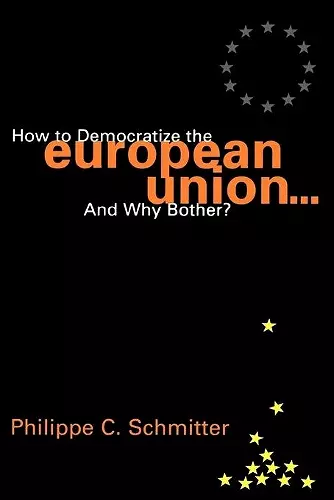How to Democratize the European Union...and Why Bother?
Format:Paperback
Publisher:Rowman & Littlefield
Currently unavailable, and unfortunately no date known when it will be back

A contradictory creation indeed, the European Union has most of the institutions of a modern democracy, yet it does not function as one. Moreover, its growing scope of activity and supranational decision making processes are undermining the legitimacy of democracy in its member states. Much has been written about this double "democratic deficit," but surprisingly little thought has been given to what to do about it—short of drafting and ratifying a new federal constitution. In this provocative book, Philippe C. Schmitter explores both the possibility and the desirability of democratizing the EU. He argues that as a "non-state" and a "non nation" it will have to invent new forms of citizenship, representation, and decisionmaking if it is ever to democratize itself. The author also contends that the timing and political context work against a full-scale constitutionalization of the process. He proposes a number of modest (and some less modest) reforms that could improve the situation in the near future and eventually lead to a genuine Euro-democracy.
Schmitter's book is a timely and valuable contribution to European integration literature. The book is to be recommended not only to anyone with interest in European integration but also to comparativists who focus on transitions to democracy. * Canadian Journal of Political Science *
This book offers a series of ingenious propositions aimed at making the European Union more democratic. . . . Along with pitching sensible proposals concerning citizenship, Schmitter offers a system of representation that would make the European Parliament less of a conglomeration of national representatives and more of a forum for creating genuine European parties. He also addresses EU decisionmaking, arguing for dividing member states into three clusters and establishing a requirement of concurrent majorities. Europe-wide referendums, including those on the method of designing European institutions, are another suggestion. His argument about the EU's need for democratization is convincing. * Foreign Affairs *
The greatest asset of this book lies in its ability—with its coherent set of original proposals—to make the reader reconsider the ways in which the nature of the Euro-polity is peculiar and problematic. * International Affairs *
A refreshingly practical, yet theoretically sophisticated, extended essay that offers a number of 'modest (and some less modest)' suggestions for reform of the EU intended cumulatively to effect a 'reinvention' of its citizenship, representation and decision making structures. This is an exhilarating work, timely and relevant . . . deserves to be read by anyone concerned with the fate of the EU. * Political Theory *
A thought-provoking book that suggests that it may be timely to begin to improve the quality of Euro-democracy through some modest reforms in the way citizenship, representation and decision-making are practised within the institutions of the European Union. * European Access Plus *
Schmitter offers here a pointed description, as comprehensive as it is concise, of the daunting agenda of building a future democratic European polity. Building such a polity involves a gain for all in the long run, but also a very definite loss for member polities and their sovereignty in the short run. How can short-run rationality be stopped from killing long-term objectives? Schmitter's original and tightly argued set of proposals suggest how this can be accomplished. —-Claus Offe, Humboldt University, Berlin -- Claus Offe, Humboldt University, Berlin
ISBN: 9780847699056
Dimensions: 229mm x 147mm x 12mm
Weight: 236g
160 pages